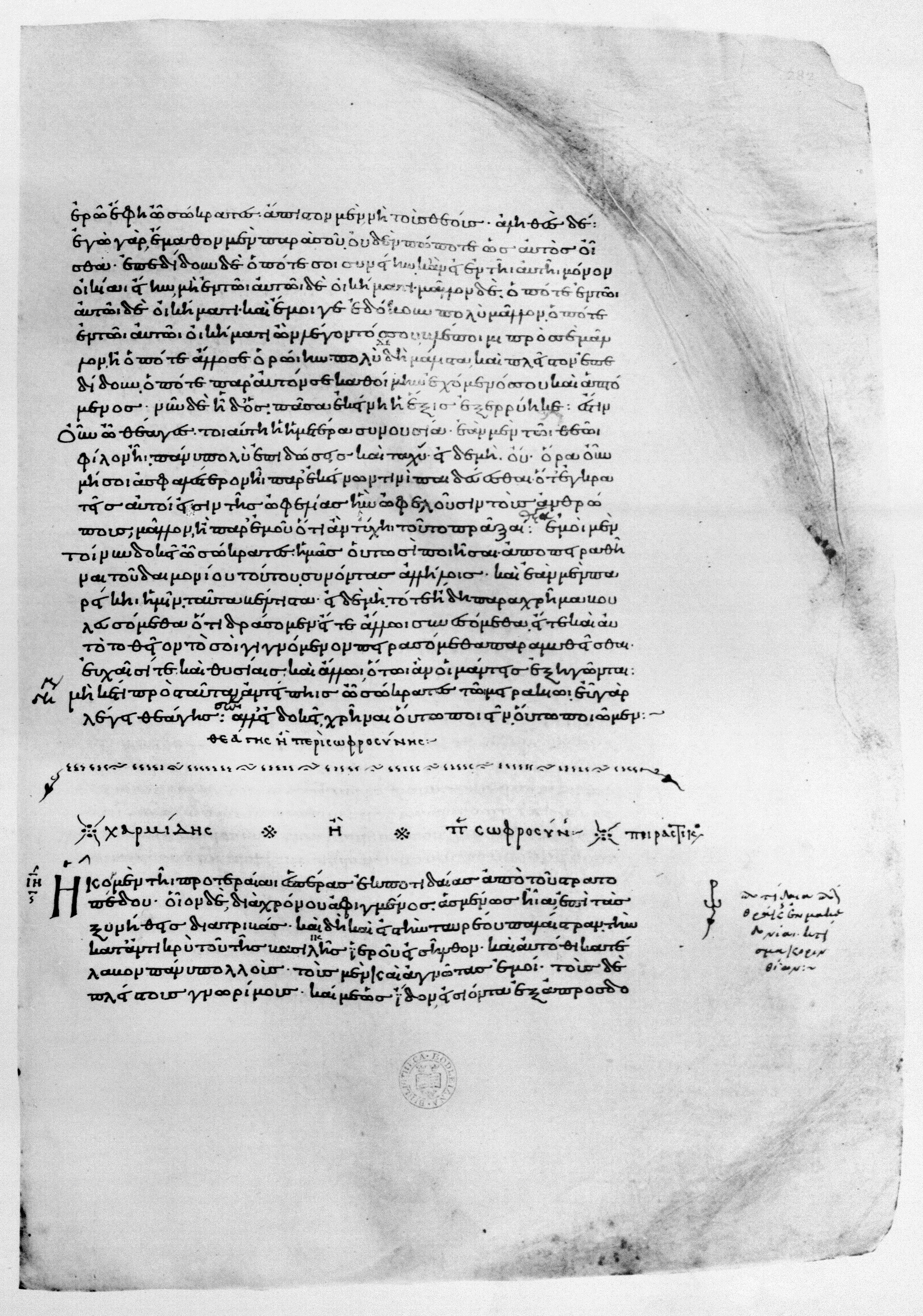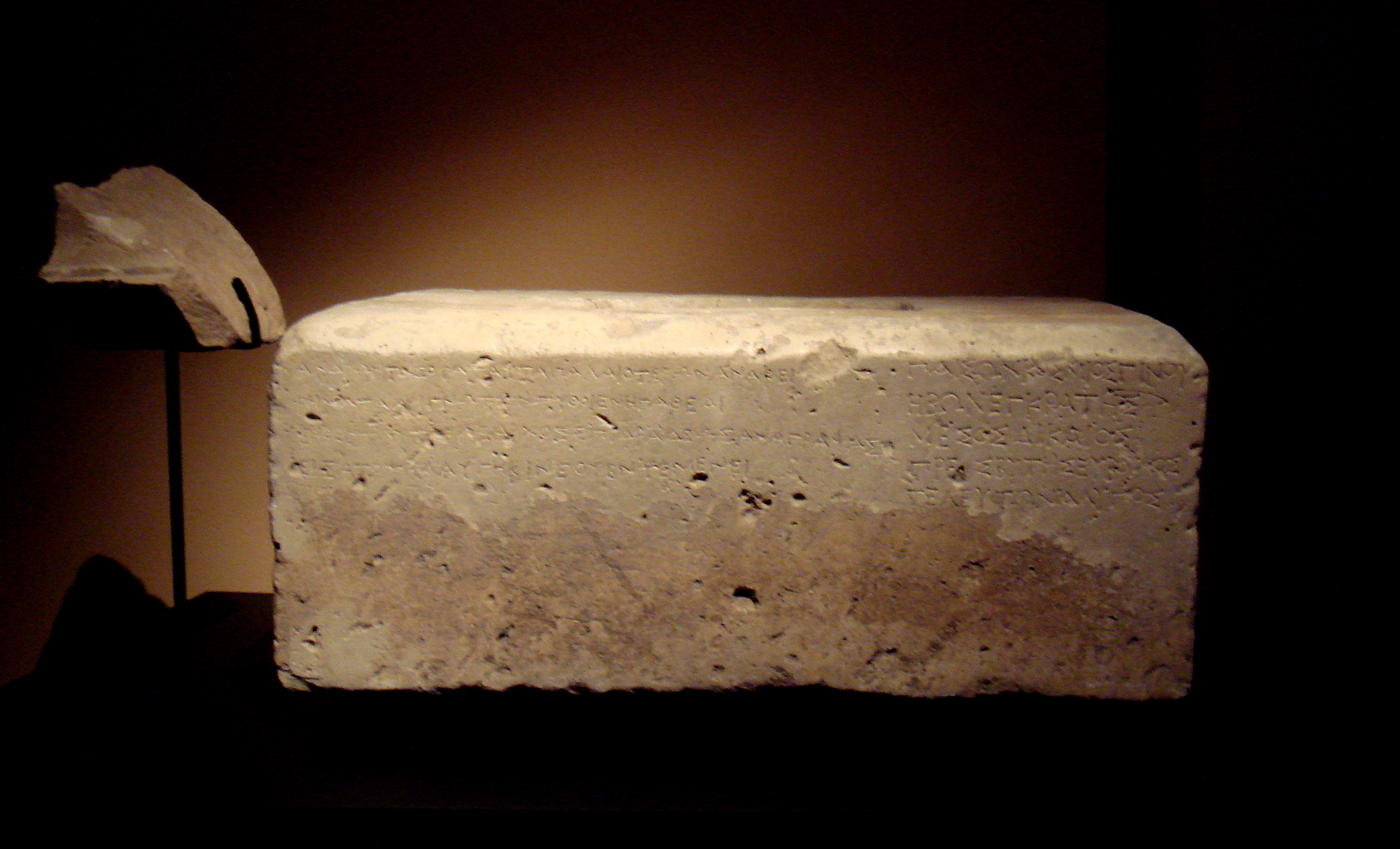|
Delphic Maxims
The Delphic maxims are a set of maxims inscribed on the Temple of Apollo at Delphi. Originally, they were said to have been given by the Greek god Apollo's Oracle at Delphi, Pythia, and therefore were attributed to Apollo. Plato attributed them to the Seven Sages of Greece, as did the 3rd-century doxographer Diogenes Laertius and the 5th-century scholar Stobaeus. Contemporary scholars, however, hold that their original authorship is uncertain, and that "most likely they were popular proverbs, which tended later to be attributed to particular sages". Roman educator Quintilian argued that students should copy these aphorisms often to improve their moral core. Perhaps the most famous of these maxims is " know thyself", which was the first of three maxims carved above the entrance to the Temple of Apollo at Delphi. The specific order and wording of each maxim varies among different versions (and translations) of the text. Not all maxims appear in all versions. Entrance maxims T ... [...More Info...] [...Related Items...] OR: [Wikipedia] [Google] [Baidu] |
Maxim (philosophy)
A maxim is simply a moral rule or principle, which can be considered objective or subjective, and dependent on one's philosophy. A maxim is often pedagogical and motivates specific actions. The '' Oxford Dictionary of Philosophy'' defines it as: Deontological ethics In deontological ethics, mainly in Kantian ethics, maxims are understood as subjective principles of action. A maxim is thought to be part of an agent's thought process for every rational action, indicating in its standard form: (1) the action, or type of action; (2) the conditions under which it is to be done; and (3) the end or purpose to be achieved by the action, or the motive. The maxim of an action is often referred to as the agent's intention. In Kantian ethics, the categorical imperative provides a test on maxims for determining whether the actions they refer to are right, wrong, or permissible. The categorical imperative is stated canonically as: "Act only according to that maxim whereby yo ... [...More Info...] [...Related Items...] OR: [Wikipedia] [Google] [Baidu] |
Charmides (dialogue)
The ''Charmides'' (; grc-gre, Χαρμίδης) is a dialogue of Plato, in which Socrates engages a handsome and popular boy named Charmides in a conversation about the meaning of ''sophrosyne'', a Greek word usually translated into English as "temperance," "self-control," or "restraint." When the boy is unable to satisfy him with an answer, he next turns to the boy's mentor Critias. In the dialogue, Charmides and then later Critias champion that Temperance is "doing one's own work" but Socrates derides this as vague. The definition given next of "knowing oneself" seems promising but the question is then raised if something can even have the knowledge of itself as a base. As is typical with Platonic early dialogues, the two never arrive at a completely satisfactory definition, but the discussion nevertheless raises many important points. The ''Charmides'' is one of Plato's most homoerotic dialogues. Socrates admires Charmides' beauty at the beginning of the dialogue, saying "I s ... [...More Info...] [...Related Items...] OR: [Wikipedia] [Google] [Baidu] |
Clearchus Of Soli
Clearchus of Soli ( el, Kλέαρχoς ὁ Σολεύς, ''Klearkhos ho Soleus'') was a Greek philosopher of the 4th–3rd century BCE, belonging to Aristotle's Peripatetic school. He was born in Soli in Cyprus. He wrote extensively on eastern cultures, and is thought to have traveled to the Bactrian city of Ai-Khanoum (Alexandria on the Oxus) in modern Afghanistan. Writings Clearchus wrote extensively around 320 BCE on Oriental cultures, from Israel to Persia to India, and several fragments from him are known. His book "Of Education" (Greek: , ''Peri paideiās'') was cited by Diogenes Laërtius. Clearchus in particular expressed several theories on the connection between western and eastern religions. In "Of Education", he wrote that "the gymnosophists are descendants of the Magi". In another text, Josephus the first-century Romano-Jewish scholar claimed that Clearchus has reported a dialogue with Aristotle, where the philosopher states that the Hebrews were descendants of the ... [...More Info...] [...Related Items...] OR: [Wikipedia] [Google] [Baidu] |
Oikistes
The ''oikistes'' ( gr, οἰκιστής), often anglicized as oekist or oecist, was the individual chosen by an ancient Greek polis ''Polis'' (, ; grc-gre, πόλις, ), plural ''poleis'' (, , ), literally means "city" in Greek. In Ancient Greece, it originally referred to an administrative and religious city center, as distinct from the rest of the city. Later, it also ... as the leader of any new colonization effort. He was invested with the power of selecting a settling place, directing the initial labors of the colonists and guiding the fledgling colony through its hard early years. The oracle is also consulted during deliberations for choosing an ''oikistes''. After he is appointed and directed to found a colony, he also consults the Delphic oracle. Due to his authority, the ''oikistes'' was often accorded his own cult after his death, and his name was preserved even when all other details of the founding of a colony were forgotten. References Society of ancient ... [...More Info...] [...Related Items...] OR: [Wikipedia] [Google] [Baidu] |
Afghanistan
Afghanistan, officially the Islamic Emirate of Afghanistan,; prs, امارت اسلامی افغانستان is a landlocked country located at the crossroads of Central Asia and South Asia. Referred to as the Heart of Asia, it is bordered by Pakistan to the east and south, Iran to the west, Turkmenistan to the northwest, Uzbekistan to the north, Tajikistan to the northeast, and China to the northeast and east. Occupying of land, the country is predominantly mountainous with plains in the north and the southwest, which are separated by the Hindu Kush mountain range. , its population is 40.2 million (officially estimated to be 32.9 million), composed mostly of ethnic Pashtuns, Tajiks, Hazaras, and Uzbeks. Kabul is the country's largest city and serves as its capital. Human habitation in Afghanistan dates back to the Middle Paleolithic era, and the country's Geostrategy, strategic location along the historic Silk Road has led it to being described, pict ... [...More Info...] [...Related Items...] OR: [Wikipedia] [Google] [Baidu] |
Greco-Bactrian Kingdom
The Bactrian Kingdom, known to historians as the Greco-Bactrian Kingdom or simply Greco-Bactria, was a Hellenistic-era Greek state, and along with the Indo-Greek Kingdom, the easternmost part of the Hellenistic world in Central Asia and the Indian Subcontinent from its founding in 256 BC by Diodotus I Soter to its fall BC under the reign of Heliocles I. It covered much of present-day Afghanistan, Uzbekistan, Tajikistan and Turkmenistan, and at its zenith, parts of Iran and Pakistan. An extension further east with military campaigns may have reached central Gansu province in China. Bactria was ruled by the Diodotid dynasty and rival Euthydemid dynasty. The capitals of Ai-Khanum and Bactra were among the largest and richest of antiquity - Bactria itself was known as the ‘''land of a thousand golden cities’''. The Indo-Greek Kingdoms, as Bactrian successor states, would last until 10 AD. History Independence and Diodotid dynasty Diodotus, the satrap of Bactria (and pr ... [...More Info...] [...Related Items...] OR: [Wikipedia] [Google] [Baidu] |
Ai-Khanoum
Ai-Khanoum (, meaning ''Lady Moon''; uz, Oyxonim) is the archaeological site of a Hellenistic city in Takhar Province, Afghanistan. The city, whose original name is unknown, was probably founded by an early ruler of the Seleucid Empire and served as a military and economic centre for the rulers of the Greco-Bactrian Kingdom until its destruction BC. Rediscovered in 1961, the ruins of the city were excavated by a French team of archaeologists until the outbreak of conflict in Afghanistan in the late 1970s. The city was probably founded between 300 and 285 BC by an official acting on the orders of Seleucus I Nicator or his son Antiochus I Soter, the first two rulers of the Seleucid dynasty. It was originally thought to have been founded by Alexander the Great, quite possibly as Alexandria Oxiana, but this theory is now considered unlikely. There is a possibility that the site was known to the earlier Achaemenid Empire, who established a small fort nearby. Locate ... [...More Info...] [...Related Items...] OR: [Wikipedia] [Google] [Baidu] |
Hestia
In ancient Greek religion and mythology, Hestia (; grc-gre, Ἑστία, meaning "hearth" or "fireside") is the virgin goddess of the hearth, the right ordering of domesticity, the family, the home, and the state. In myth, she is the firstborn child of the Titans Cronus and Rhea, and one of the Twelve Olympians. According to ancient Greek tradition, Hestia was along with four of her five siblings devoured by her own father Cronus as an infant due to his fear of being overthrown by one of his offspring, and was only freed when her youngest brother Zeus forced their father to disgorge the children he had eaten. Cronus and the rest of the Titans were cast down, and Hestia then became one of the Olympian gods, the new rulers of the cosmos, alongside her brothers and sisters. After the establishment of the new order and in spite of her status, Hestia withdraws from prominence in mythology, with few and sparse appearances in tales. Similar to what Athena and Artemis did, Hesti ... [...More Info...] [...Related Items...] OR: [Wikipedia] [Google] [Baidu] |
First Alcibiades
The ''First Alcibiades'', also referred to as ''Alcibiades Major'' and abbreviated as ''Alcibiades I'' ( el, Ἀλκιβιάδης αʹ), is a dialogue depicting Socrates in conversation with Alcibiades. It is ascribed to Plato, although scholars are divided on the question of its authenticity. Content In the preface Alcibiades is described as an ambitious young man who is eager to enter public life. He is extremely proud of his good looks, noble birth, many friends, possessions and his connection to Pericles, the leader of the Athenian state. Alcibiades has many admirers and had many lovers but they have all run away, afraid of his coldness. Socrates was the first of his lovers but he has not spoken to him for many years. Now the older man tries to help the youth with his questions before Alcibiades presents himself in front of the Athenian assembly. For the rest of the dialogue Socrates explains the many reasons why Alcibiades needs him. By the end of ''Alcibiades I'', the y ... [...More Info...] [...Related Items...] OR: [Wikipedia] [Google] [Baidu] |
Laws (dialogue)
The ''Laws'' (Greek: Νόμοι, ''Nómoi''; Latin: ''De Legibus'') is Plato's last and longest dialogue. The conversation depicted in the work's twelve books begins with the question of who is given the credit for establishing a civilization's laws. Its musings on the ethics of government and law have established it as a classic of political philosophy alongside Plato's more widely read '' Republic''. Scholars generally agree that Plato wrote this dialogue as an older man, having failed in his effort to guide the rule of the tyrant Dionysius I of Syracuse, instead having been thrown in prison. These events are alluded to in the '' Seventh Letter''. The text is noteworthy as Plato's only undisputed dialogue not to feature Socrates. Summary Setting Unlike most of Plato's dialogues, Socrates does not appear in the ''Laws'': the dialogue takes place on the island of Crete, and Socrates appears outside of Athens in Plato's writings only twice, in the ''Phaedrus'', where he ... [...More Info...] [...Related Items...] OR: [Wikipedia] [Google] [Baidu] |






